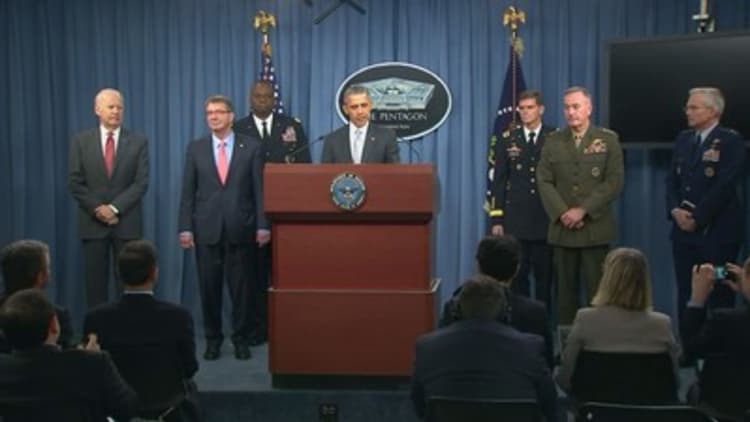If all goes according to the polls, Taiwan will elect its first female president within the next 24 hours, but that may be beside the point.
The vote appears likely to install into power a political party that has sought Taiwanese independence in the past and which may cool relations with China. Polls indicate that front-runner Tsai Ing-wen's Democratic Progressive Party (DPP) is poised to take control of Taiwan's parliament on Saturday, and Tsai herself holds a double-digit lead in the race for president.
"The DPP's official stance is that Taiwan is independent and sovereign," Michael Fonte, director of the Taiwan Democratic Progressive Party Mission in the U.S., told CNBC on Friday. "If anyone wants to change that status, the DPP and Tsai believe that the people of Taiwan would have to vote on a referendum for that change."
No one is predicting a military conflict in East Asia, but investors, analysts and political scientists are closely trying to gauge the election's implications, which directly involve not just Taiwan but also the two biggest economies on earth — the United States and China.
'A really tough background of economic growth'
Economic factors — not just Taiwan's links to mainland China, but also the challenges Taiwan faces in building economic relationships with other countries — are likely to prevent a meltdown in the region.
The battleground issue of the campaign has been the state of the Taiwanese economy, which by some measures is doing fairly well. The unemployment rate in Taiwan is currently at 3.91 percent, compared with roughly 5 percent in the United States.
However, Taiwan's directorate-general of budget, accounting and statistics, reported a 0.63 percent contraction in GDP in the third quarter. Both parties promised to expand the economy — the Beijing-backed KMT wants to encourage tourism between Taiwan and China, while the DPP wants to diversify Taiwan's trade partnerships.
"This is not a partisan issue," said Thomas Vien, East Asia analyst at geopolitical research firm Stratfor. He added that "this is all happening against a really tough background of economic growth. … It's not within (the parties') control to deliver on all of these promises, but they'll try to ameliorate the isolation placed on Taiwan."

The Taiwanese accounting office attributes the economic decline to the falling price of crude oil, lower global demand for consumer electronics, and the transfer of much of Taiwan's manufacturing base to China. That last reason is the one that sticks.
Robert Manning, resident senior fellow at the Brent Scowcroft Center on International Security, said that just between the jobs in transports, telecommunications and semiconductor manufacturing, there's a lot of money going into China.
"There's a lot of resentment toward the level of dependence on the Chinese economy," he said.
Diversifying Taiwan's economy
Taiwan is home to several major companies, including Android phone maker HTC and Apple chip suppliers Advanced Semiconductor Engineering and Foxconn. Many of those companies are moving parts of their production chain into mainland China, adding to popular frustration with the outgoing administration, which sought the cozier relationship with Beijing.
"China is slowing down," Vien said. "Taiwan sees that it might not be so good to so closely integrate themselves with the Chinese economy if that exposure will be detrimental to them in the long run."
Even if it's generally agreed politically that a less China-dependent economy is the way forward for Taiwan, it will be hard for Tsai and the DPP to diversify its trade relationships.
"Part of the issue is structural," said Manning. "You can't undo all those investments in the mainland."
Taiwanese companies have tried to move their operations to nearby countries in Southeast Asia, but cultural and infrastructure limitations have limited them, said Douglas Paal, vice president of studies for the Carnegie Endowment for International Peace.
"China is still a greater source of growth than other partner economies," Paal said. "And the other countries have their own characteristics that make investment and trade somewhat less attractive, such as Indonesia's bureaucracy and economic nationalism, Thailand's domestic unrest and Vietnam's limited scale."
Paal also said he believes that cultural differences and communication issues make it much harder for a Taiwanese company to move its operations to a country like India rather than to China, which at least has a shared language.
The United States' obligation

Economic considerations notwithstanding, a growing number of Asia-Pacific countries are trying to find ways to counterbalance China's growing power, and both Beijing and Washington will be keeping an eye on Taipei to discern its plans should the DPP win this weekend.
"This is not good for cross-straits or for U.S.-China relations," said Lynn White, professor of politics and international affairs at Princeton's Woodrow Wilson School. He said that aspect of the election "is the one that concerns me the most in the medium term."
The 1979 Taiwan Relations Act gives officials in Washington room to maneuver should tensions rise between China and Taiwan, stating only that the U.S. president and Congress must consider "non-peaceful" interventions on Taiwan's behalf if it comes under threat. As recently as 1996, the administration of President Bill Clinton sailed a carrier battle group between Taiwan and the Chinese mainland in a show of force after Beijing missile tests and live-fire exercises in the region.
"It's a contingent declaration of war if the president at the time thinks that Taiwan's independence is in the United States' best interests," White said.



